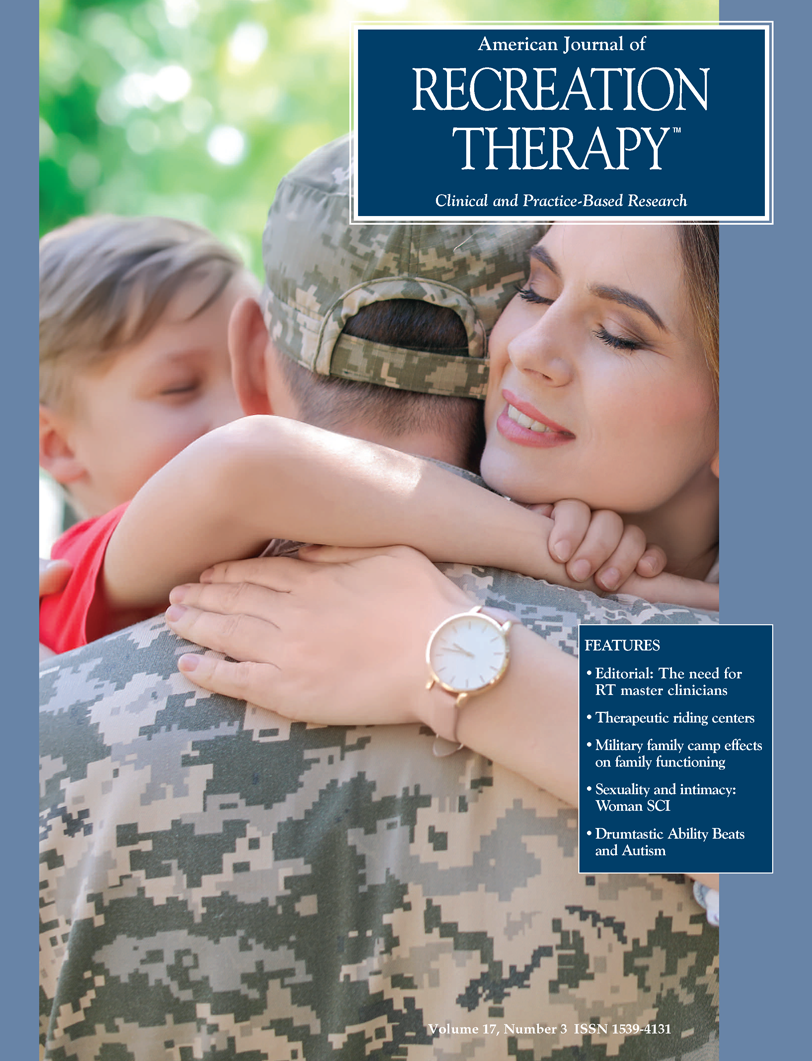Women with spinal cord injury and sexual health: The role of the recreational therapist
DOI:
https://doi.org/10.5055/ajrt.2018.0165Keywords:
sexuality, intimacy, spinal cord injury, women, sexual healthAbstract
Sexual health takes on an entirely new meaning for women after sustaining a spinal cord injury (SCI). The majority of sexual health information provided during the rehabilitation process is often geared toward men with limited to no resources available to women. Furthermore, this information is typically not provided by recreational therapists in structured sexual health groups. This study employed semistructured interviews with eight SCI women living independently in the community to examine sexuality and intimacy while living with a SCI and how sexual health is currently being addressed during the rehabilitation process, including the recreational therapy process. A phenomenological data analysis was employed with reduction of data into themes. Findings indicate that sexual health education information was sometimes provided in rehabilitation hospitals, however, such materials were perceived to be focused on male patients, untimely, and attention to sexuality issues was usually absent from post-rehabilitation care. There was no mention of recreational therapists providing any form of sexual health education. Additionally, participants identified a need for educational materials for partners of individuals with SCI, as well as themselves regarding sexuality and relationship with particular attention on (a) intrapersonal constraints to intimacy/sexuality, (b) interpersonal partner communication, and (c) physiological constraints to intimacy/sexuality. The results demonstrate the impact living with a SCI has on intimacy and sexuality for women and the need for better sexual health education within the context of recreational therapy.
References
Hachem LD, Ahuja CS, Fehlings MG: Assessment and management of acute spinal cord injury: From point of injury to rehabilitation. J Spinal Cord Med. 2017; 40: 665-675.
Tallini A: Health is state of physical, mental, and social wellbeing. BMJ. 2011; 343: d5358.
World Health Organization: Health topics: Sexual health. 2018. Available at www.who.int/topics/sexual_health/en/. Accessed June 1, 2018.
Leibowitz RQ, Stanton AL: Sexuality after spinal cord injury: A conceptual model based on women’s narratives. Rehabil Psychol. 2007; 52: 44-55.
Kreuter M, Taft C, Siösteen A, et al.: Women’s sexual functioning and sex life after spinal cord injury. Spinal Cord. 2011; 49: 154-160.
World Health Organization: International Classification of Functioning, Disability, and Health (ICF). Geneva, Switzerland: WHO Publishing, 2001.
Cacioppo JT, Patrick W: Loneliness: Human Nature and the Need for Social Connection. New York: WW Norton & Company, 2008.
Thrussell H, Coggrave M, Graham A, et al.: Women’s experiences of sexuality after spinal cord injury: A UK perspective. Spinal Cord. 2018 (in press).
Esmail S, Esmail Y, Munro B: Sexuality and disability: The role of health care professionals in providing options and alternatives for couples. Sex Disabil. 2001; 19: 267-282.
Otero-Villaverde S, Ferreiro-Velasco ME, Montoto-Marques A, et al.: Sexual satisfaction in women with spinal cord injuries. Spinal Cord. 2015; 53: 557-560.
Komisaruk BR, Gerdes CA, Whipple B: ‘Complete’ spinal cord injury does not block perceptual responses to genital self-stimulation in women. Arch Neurol. 1997; 54: 1513-1520.
Sipski ML: Sexual functioning in the spinal cord injured. Int J Impot Res. 1998; 10: S128-S130.
Jackson AB, Wadley V: A multicenter study of women’s self-reported reproductive health after spinal cord injury. Arch Phys Med Rehab. 1999; 80: 1420-1428.
Snead B, Hsieh P, Snethen G: Sexual identity and discrimination: Creating a welcoming environment for sexual minority consumers. Ther Recreation J. 2016; 50: 172-175.
Fronek P, Booth S, Kendall M, et al.: The effectiveness of a sexuality training program for the interdisciplinary spinal cord injury rehabilitation team. Sex Disabil. 2005; 23: 51-63.
Elliott S, Hocaloski S, Carlson M: A multidisciplinary approach to sexual and fertility rehabilitation: The sexual rehabilitation framework. Top Spinal Cord Inj Rehabil. 2017; 23: 49-56.
National Spinal Cord Injury Statistical Center: Spinal Cord Injury Facts and Figures. Tuscaloosa, AL: University of Alabama, 2018.
Creswell JW: Research Design: Qualitative, Quantitative, and Mixed Methods Approaches. 4th ed. Thousand Oaks, CA: Sage, 2014.
Starks H, Brown Trinidad S: Choose your method: Phenomenology, discourse analysis, and grounded theory. Qual Health Res. 2007; 17: 1372-1380.
Hassouneh-Phillips D, McNeff E: “I thought I was less worthy”: Low sexual and body esteem and increased vulnerability to intimate partner abuse in women with physical disabilities. Sex Disabil. 2005; 23: 227-240.
Klein M: Sexual Intelligence. New York: HarperOne, 2012.
Published
How to Cite
Issue
Section
License
Copyright 2000-2025, Weston Medical Publishing, LLC and American Journal of Recreation Therapy. All Rights Reserved.


